The path to Ruler of the Known World is a long and tortuous one, riddled with potholes and perils. The road is littered with the bodies of those who tried and failed. Sun bleached bones pockmarked with blunt force trauma are all that is left of many an aspiring dictator.
This, to, is your destiny as long as you dream of glory beyond the borders of your own, small empire. Sooner or later you’ll end up a bloodied buzzard brunch as reality inevitably overruns your dreams.
Fear not! You have at your disposal the Rough Guide to Greatness, an invaluable tome of knowledge known only to yourself and anyone peering over your shoulder. So unsheathe your dagger, deal with the lurker and read on. Don’t forget to wash the blood off your hands.
Lesson 1 – The Economy or how to make a motza in the Ancient World
A strong economy is the foundation of any well-founded empire. Order the Royal scribe to bring you the National Accounts.
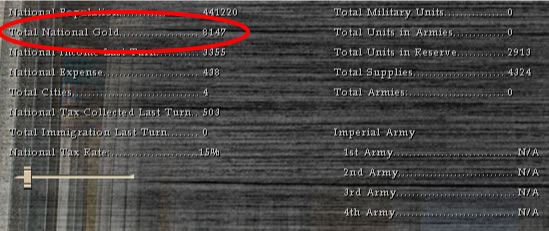
Your mighty kingdom has a total of 8147 gold to its name. Ah, but all is not as it
seems. Before you rush out and order the latest model executive chariot with the six
prancing white stallions consider that you don’t actually have all this money in the
royal treasury.

Your 8147 gold is the total of all the gold residing in each of your cities. Note that for the purposes of explanation the Empire of the Day is Egypt (Queen of the Nile, 44 BC) which has the four cities noted above with Alexandria being the capital.
What difference does this make? Quite a bit as you can transfer money from your capitol to another city but not vice versa. So the 725 gold sitting in the Thebean vault isn’t gold that you can use to fund imperial activities. It is Thebean money controlled by the Thebean Governor.
What you can do is ask him – or let him – spend it on items that matter to Thebes. This could, of course, be a Thebean army that goes of to fight on behalf of the Egyptian Kingdom but it will still be a Thebean army, not an Imperial one.
If you and the Governor of Thebes have a falling out then the Thebean army may decide to rebel.
In practical terms your ready, liquid assets available for imperial activities are only those residing in the Royal vaults, in this case Alexandria, the capital.
Mmm. Scratching your head you ask the Royal scribe to point out your quarterly income (every turn being 3 months in time).
3355 gold ! That's heck of a lot of money. Perhaps, you think, I can afford last year's chariot, the one with the four horses instead of the big six.
Nope. National Income is the amount of money your Kingdom generated in total. Each city provides a total production figure in their city info screen. This is in gold.
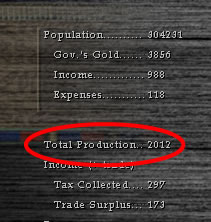
Consider it to be sort of a gross domestic product (GDP) measure. Your hard working citizens get to keep most of it. Only a portion of it trickles it into the Royal Treasury.
How much is determined by the National Tax rate. This is part of your nation summary that your scribe is holding up in front of you. Good man, keep it steady.
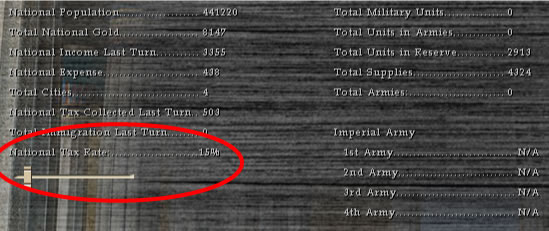
So 15% of last turns National income of 3355 is 503 gold which, as your scribe is pointing out to you, is the exact amount of the National Tax Collected last turn.
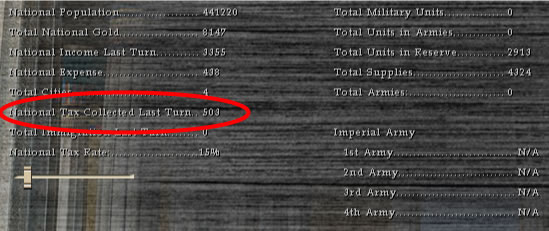
What about the costs of running your Kingdom? National Expenses. Right here.
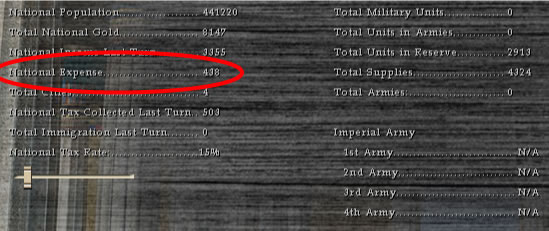
The first being your Imperial expenses. These consist of the salary for yourself, the Ruler, (you weren’t expecting to live on hands out and charity were you?), your Prime Minister and his Cabinet of Ministers and any Imperial Generals.
This runs you around the following every turn.
Ruler 25 gold
Prime Minister 22 gold
Each Minister 17 gold
Generals 7 gold
Note that Generals have to be paid a salary regardless of wether they are employed or not. Generals have a certain status and expect to be paid accordingly.
If we have a look at the current Imperial line up in the Royal court we find the following...
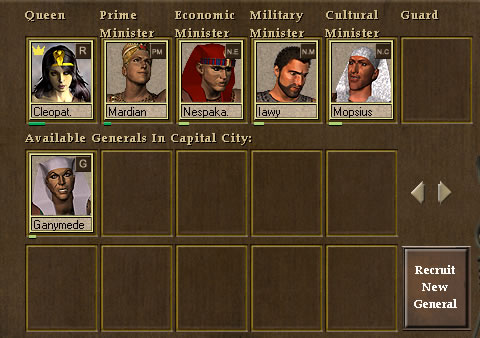
Cleopatra, the Ruler costs 25, Mardian the PM another 22, the three surly looking Ministers 17 each and Ganymede the General, currently on the reserve bench, 7 gold making a total of 105 gold.
The Imperial personnel costs are found in the City Info screen for your capital, Alexandria.
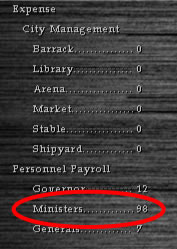
No. Have a look at the City Personnel screen for Alexandria.
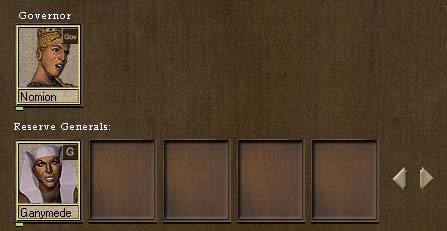
The 7 gold for Ganymede isn’t considered an Imperial Personnel cost. He comes under the City Payroll, hence the 7 gold noted above under ‘Generals’. This is also the case for any Generals and Admirals on active duty in the Imperial armies or navies.
Going back to the Ministers cost of 98 gold above that’s exactly what we have when we take Ganymede (7 gold) off the Imperial Payroll (105 gold).
Each city has a Governor, each costing 12 gold a turn. You can see this on Alexandria’s Personnel Payroll above.
Getting back to the big picture your National Expenses are a total of each of your cities Expenses. These consist of the Personnel Payroll and any building budget allocations. We’ll come to these in a moment but don’t forget that your capitol also carries the cost of the Imperial payroll.
Have another look at the Alexandria list of expenses above. Under ‘City management’ are a list of entries, one for each building. These correspond directly to the budget amounts allocated in the City Hall.
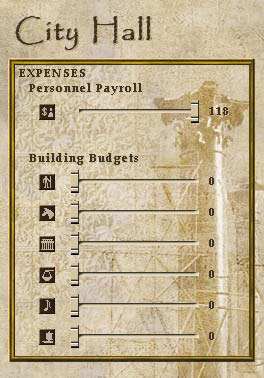
It's currently showing 118 gold. Ask the scribe to show you the Alexandria Personnel Payroll again.

In times of hardship you could ask your Ministers, Governors and Generals in a particular city to partake of some frugality and forgo salary. Tweak the slider appropriately and stand well back as they start to squawk and bluster.
Lesson 2 – Squeezing the Lemon or how to get the best out of your Characters
Strength and Honour features a four layered government system, not dissimilar to the real world. Like reality, your government ranks are filled with a kaleidoscope of people from highly skilled administrators to dribbling, drooling idiots.
The Pyramid starts with you, the mighty Ruler, at the top and descends to your Prime Minister, thence to your relevant Cabinet Minister and finally to your city Governor.
Each and every one of these people has an effect on various aspects of your empire. They are all important.
The accumulation of the total management talent available for any particular task is expressed as an 'efficiency' percentage. You guessed it, the greater the number the more efficient they are.
Think about the garbage collection service in your street. Multiple levels of government and bureaucracy contribute to the service either directly or indirectly. Most of the time your garbage is collected but there are occasional weeks when it isn't.
The efficiency of your garbage collection service is determined by the people running it (the Government), how much money is thrown at the problem (the Budget) and the philosophical bent of your city (do we even believe in garbage collection?). The combination of all these give an Overall efficiency rating as shown in the Market below.
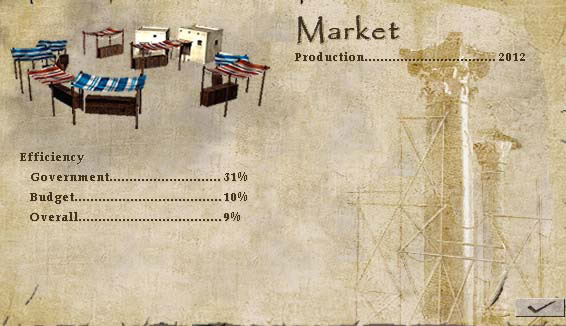
Keep in mind that the Government efficiency is in itself a combination of your four layers of government. With the market we are dealing with the Ruler, the Prime Minister, the Economic Minister and of course, the Governor.
With each of these four individuals it is their Political skill that determines their efficiency. This isn't all that intuitive until you start thinking of political skill as an amalgamation of political, managerial and administrative abilities.
A number of in-game formulas determine the government efficiency. Without going into the nuts and bolts it's worth investigating just what effect each person has.
For starters the formula's split their calculations between local government (the Gov.) and the central government (Ruler / PM / Minister). The central government is a 25 / 25 / 50 split between the Ruler, the PM and the relevant minister respectively.
Ah huh! In the case of the Markets my Economic Minister is the key position.
Yes and no. He does have as much influence as your Ruler and Prime Minister combined but don't forget that your Ruler and Prime Ministers' political skills extend over a much wider area of responsibility than that of an individual minister making them just as, if not more important.
What about the split between local and central governments?
We can test this. Let's put ding dongs in charge of the central government ( Political skill of 1 ) and a solid performer (Political skill of 75) in charge of local government and see what efficiency we get. Then we’ll swap them around and check again.
Case 1: Central Government ( ding dongs ) Local Government ( very capable ) - Government efficiency of 25%
Case 2: Central Government (very capable ) Local Government ( ding dong) - Government efficiency of 12%
It's obvious that the local government (the Governor) is the most important person in the management chain by far. This makes sense as a city level function such as the Market would be heavily influenced by the level of government that directly controls it. The more remote central government has an influence but it is of a smaller magnitude befitting its hands off status.
Just for giggles let's put solid performers in both levels of government and see what happens.
Case 3: Central Government (very capable) Local Government (very capable) - Government efficiency of 65%
Now we are cooking! The wheels of bureaucracy are well oiled and turning nicely. But also note that of the 65% only 12% of it was due to a capable central government. The Governor of Alexandria contributed the other 53%.
In summary a good Governor can overcome a weak Prime Minister or Minister but not vice versa.
O.K, lets have a closer look at the Alexandria Markets and it's so-so 31% government efficiency.
We'll start with at the bottom with the Governor.
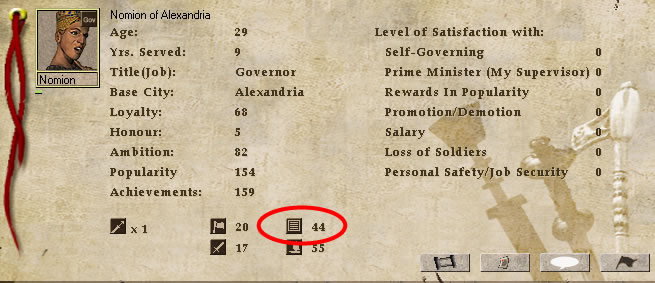
Nomion's Political skill here is 44 out of 100 which is passable given that he appears to have serious dental issues.
Next up the chain is the Economic Minister.
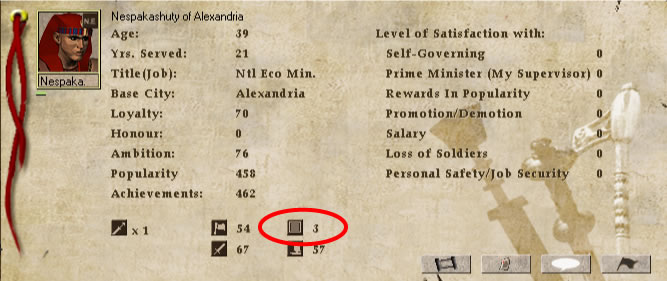
A one man administrative nightmare. Everything he touches will instantly turn to lead and sink to the bottom of the Nile.
Talk about a round peg in a black hole. Look at his stats. He has leadership potential, a trained military mind and can probably tell the front end of a galley from its stern. Yet despite all this he has been promoted to the Cabinet and made – of all possible things – Economic Minister! Hand him a scroll of numbers and the only useful thing he could feasibly do with it involves manually controlled toilet operations of a personal nature.
Imagine Nespakashuty in charge of the Federal Reserve in today's World’s Biggest Economy. Imagine his first press conference when asked about the future direction of interest rates.
Visualise the network camera's zooming in on his hooded, simian eyes as he gives an impromptu talk about how he is so hung over from last night's drunken romp with the President's wife at the White House (have a look at his honour score) that he can't think straight and who the hell wants to know anyway?
As you march towards to greatness how far do you think you’ll get with the likes of Nespakashuty fumbling with the controls of your economic engine?
Moving on to the Prime Minister.
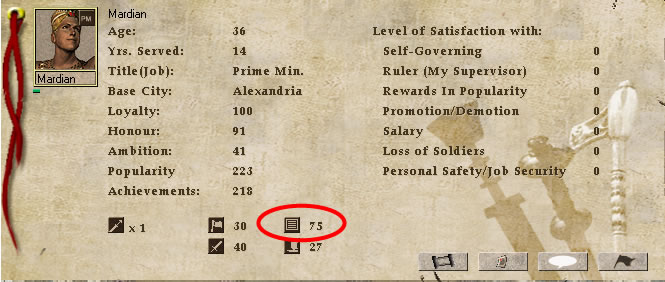
Lastly, your good self, the Ruler.
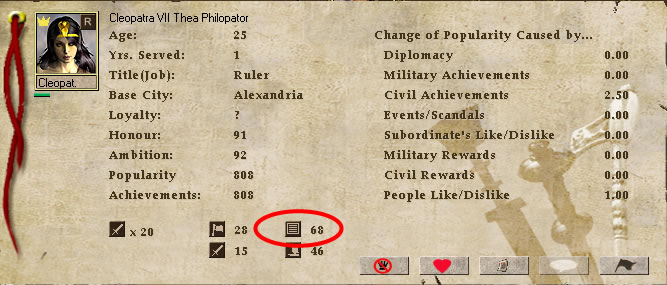
Summarising we have a couple of political and administrative dynamos at the top of the pyramid, a run of the mill governor at the bottom and a complete fiasco in the middle.
About now I'll re-emphasise the obvious point that having the right people with the right skill set in the right positions is terribly important. If you wish to succeed it's essential.
Before we move onto something else let's have a quick look at the depth of managerial talent available in the ancient world.
I've used three separate empires – the Egyptians, a learned race of traders, the Han, far-eastern bureaucrats and the Lutetia, well you may ask.
Taking the Egyptians first we find the average political skill across all characters in the empire is 41. The percentage of characters with a better than average political skill ( >50 ) is 30% and the highest level found in the empire is 75 (Mardian, the PM).
So here we have a significant depth of managerial talent available with very few nonperformers, Nespakashuty not-withstanding.
Next is the Han. The average political skill found within is 38, a little lower than the Egyptians but still reasonable as you'd expect from a race of people where most aspire to be an imperial mandarin.
The percentage of characters with a better than average political skill is only 12%, however, so the talent is there but it’s thin on the ground.
The Ruler, Yuan-Di, tops out the list with the stellar skill level of 97. Too bad he spent so much time frolicking with his concubines that he ended up cross-eyed.
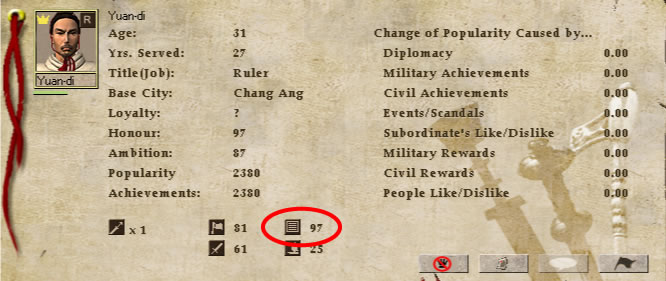
Here is a man destined for a short and painful life.
His loyalty is a virtue but he has little honour and a track record of achievement that has as its highlight his ability to make it from sunrise to sunset without getting kicked in the gonads by unfriendly yaks.
He knows nothing about boats (hey, he’s from Kashgar), would trip over his own sword in battle and has divined all he knows about politics and administration from the entrails of slaughtered pigs.
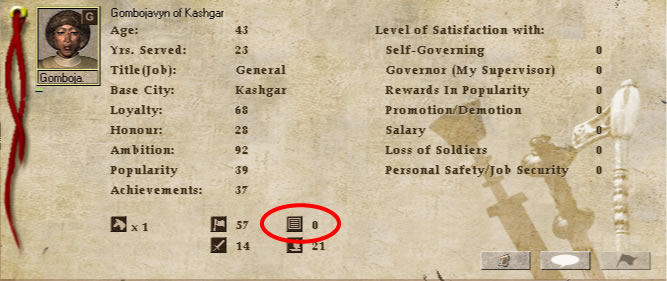
Couple all of the above with a sky high ambition of 92! Here is a person with a burning drive to succeed yet with no meaningful talents or skills.
His ambition is so stratospheric that it will likely override any measure of self preservation and see him waggling his huge honker at Yaun-di, the ruler, demanding that he step aside and make room for a better man, a-la-himself. Like I said, a short, painful existence.
Yep, Gombojavyn of Kashgar, available through all reputable employment agencies east of the Urals. Get him while he's hot.
Last we have the Lutetians. Haven’t heard of them? Here's a clue. Their leader is Commius.
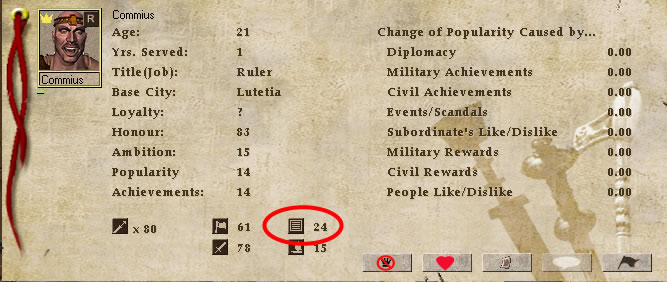
Commius looks like he eats wild animals for breakfast. Raw.
As you can gather from Commius above the Lutetians aren’t the home of managerial excellence. Their empire wide political skill average is a lowly 29. The percentage of Lutetians with an above average political skill is a mind blowing 0%. Yep, that's a zero. As in they don’t exist.
These boys (and they appear to be all boys) run around the woods half naked, howling obscenities, chopping the heads and legs of anything that moves. They haven't got time in their blood-thirsty schedules to worry about administering cities.
For them it's very simple. You kill the army, capture the city, massacre everybody within, loot it and burn it to the ground, get rollicking drunk before staggering onto the next one.
Real men measure efficiency by how many heads are in their saddle bags at the end of the day.
Lesson 3 - Taming the Beast or how to Understand your Characters
Each character (eg. A general, a minister, a governor etc.) has five different personality traits which determine how he reacts to different situations.
Three of the five traits are dynamic (they change over time) while the other two, are constant throughout.

Back in BC it wasn't enough to be the ruler of your country, you needed to be the most popular man or woman in the country.
Well that's not exactly true. What you did need to be is the most popular person amongst the leading lights of your empire.
While it might be a dog eat dog portrayal of ancient life it's probably not that far removed from our own current day society.
Consider the political party that governs your own country. Provided it's a democracy (and you’re probably not reading this if it isn't) then certain things can be taken as a given regardless of the specific country or political party.
First up is that the person currently in charge is a captive to popular opinion, expressed most succulently in opinion polls. Woe betides the leader that falls in the polls. Once his popularity drops below a certain point somebody else from his party will challenge for the position.
The point at where this happens is pretty easy to define. It will be the where the leaders popularity sinks below that of the challenger. Now the challenger can effectively present himself to the party as the more credible candidate.
If, as it occasionally happens, there are no viable challengers with sufficient popularity with the voting public then the current ruler will be left to stumble on until such times as he hoists himself back up the opinion polls or a contender eventually emerges.
Probably the main difference between today and then is that getting shafted means – in today's world – you would likely retire on a hefty pension whereas the phrase had a more literal meaning in days past. Ask Caesar.
O.K, let's have a look at the character traits. We'll start with Popularity.
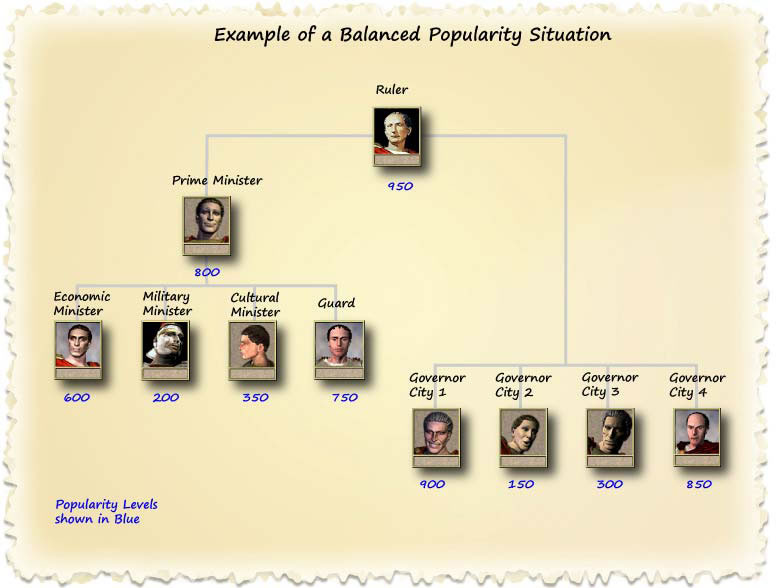
The various Governors in charge of cities throughout the country also have less popularity than their immediate boss, once again, you the Ruler.
Note that several of the Governors have a higher popularity than the Prime Minister or the members of your cabinet. This doesn’t matter as the hierarchy of government requires that Governors report only to the Ruler.
Given the above balanced scenario nobody is going to be angling for a better job due to their overwhelming popularity with the plebs as everyone's boss is more popular than they are.
This isn't the case below.
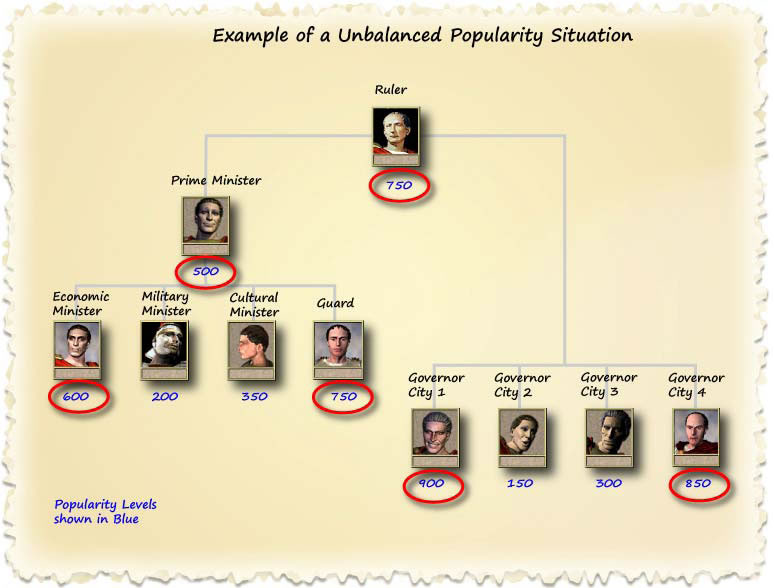
Even worse your Guard is showing all the signs of becoming more popular than you. I'm not entirely sure if the Guard would attempt to usurp you but as a general principle it's probably unwise for the character directly entrusted with your personal security to entertain delusions of grandeur.
You don't just have Cabinet problems. Two of your Governors are more favoured by the plebs than yourself. This is a recipe for instability and left unchecked may have serious ramifications later on.
The ideal situation is the balanced scenario at the top. The worst situation is the extremely unbalanced one at the bottom (it can get worse – the bigger the popularity differentials the nastier it becomes). For a variety of reasons the ideal isn’t an easily achieved outcome and you’ll probably spend most of your time somewhere in between.
Popularity is just one aspect of a character's makeup, an important one nevertheless. Let's have a look at how it all ties together.

The impact of these is expressed in a characters level of satisfaction. Positive events increase satisfaction and negative decrease as you'd expect.
The magnitude of the changes to their satisfaction is determined by a combination of their ambition and honour (remember, the two constant traits). Characters with high ambition will leverage any changes to their satisfaction levels over those with little ambition.
Honourable characters tend to take it on the chin, good or bad, and experience less satisfaction swings as they strive for the greater good. Their less honourable colleagues don't, unfortunately, see things in the same light and tend to take it more personally.
So the each event / popularity imbalance that affects a character impacts their level of satisfaction in two ways. The size or magnitude of the change is determined by their ambition. The rate of change (eg. how fast it ramps up or down over time) is determined by their honour.
This is a pretty easy system to get your head around if you consider your own job. During your time at work many factors influence your thoughts towards your employer. If you're highly ambitious then these factors tend to take on a larger than life dimension. Eg. 'They promoted that loser over me!!'.
If you were brought up with a social conscious and the urge to stand up and offer old ladies your seat on the train then it's likely you'll have a high honour score and are willing to cut your employer a significant amount of slack when adversity strikes. On the flip side, if you are of the opinion that little old ladies are best left to swing in the breeze then you'll have zip patience for employer excuses.
Now Satisfaction impacts directly on Loyalty which is where it really gets interesting. Clearly a satisfied character will become increasingly loyal.
For those heading in the opposite direction watch out. An important side note is that a character with an Honour rating of above 90 (remember it's a fixed trait that doesn't change) will never rebel. They are with you until the end.
The characters level of Satisfaction determines their movement up and down the Loyalty scale. Once again Honour plays a modifying role here in slowing or accelerating the rate of change.
Note that there is an additional internal dynamic at work in that if a person's level of achievement (shown in the character display) exceeds his popularity then there will be a detrimental effect on his satisfaction. The extent of their displeasure is measured by their level of ambition. Highly ambitious characters expect to be justly rewarded for their efforts.
Rebellions. Traitors in the ranks. Rats abandoning your sinking ship.
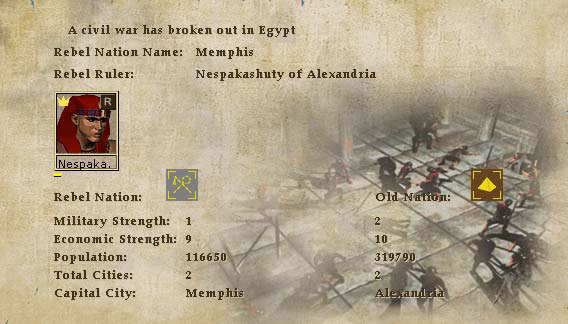
However, the lower the characters loyalty score the greater the odds of a rebellion. For a quick indication as to the risk of rebellion look at the bar under the characters portrait.
The length of the bar represents Popularity and the colour represents Loyalty. Dark green being loyal shading down to red for 'danger!' A highly popular character with low loyalty (long red bar) is heading straight for the nearest exit sign.
There is a hidden character trait, 'intelligence'. The smarter the character the better they will calculate their odds for a successful rebellion. Eg. Do I have enough military strength? Can I form alliances with the neighbours to help my cause? Etc.
A high risk character with a correspondingly high intelligence might decide that it's better to sit tight and bide his time rather than instigating a rebellion.
Then there's the idiot factor. Characters with an intelligence of 15 or less (think of an IQ under 20) not only struggle to lace their own sandals up in the morning but may decide to spontaneously rebel (provided their Loyalty score is less than 60) just because it seems like a good idea at the time.
Can you tell who the idiots are? Not really, although you'll know them when you see them. The ones sitting backwards on their horse with the big silly grins are definitely suspect.
When a character rebels the extent of the rebellion (how many other characters decide to join him) is determined by a number of factors, his popularity being one of the leading ones.
Consider popularity to be the equivalent of influence here. The power to sway others to your cause. So the more popular a potential rebel is the more dangerous they are to the integrity of your hard won empire.
Other factors that come into it are the rebelling characters military strength (does he control armies? Does his city have significant reserves?), the remoteness of the rebellion from the capital city (central authority weakens with distance) and how close to rebellion other characters are (is this the straw that broke the camels back?).
Playing dirty and taking a walk on the dark side.
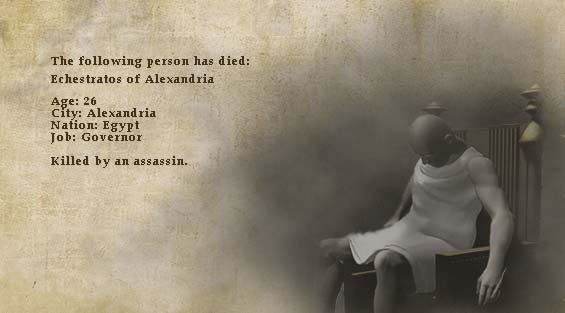
There are other ways. You could use an Assassin to permanently resolve the issue or a Corrupter to take them down a peg. It's difficult to be popular with the plebs when the local Rome Daily is reporting that you were found wandering the streets late at night in a state of 'emotional discomfort' whilst wearing a woman's toga soaked in an aromatic cocktail of fine wine and vomit.
Ah, but there is a price to be paid here.
Every time you use an Assassin or Corrupter against one of your own characters you suffer a permanent Honour point hit. Word gets around.
'Hey', you think. 'What's the big deal? I'm the Supreme Ruler, so what if my Honour drops?'
Not so fast. Remember that every time you recruit a new General their honour score is influenced by your own. The only generals that will offer to work for you if you're dishonourable are like minded scumbags.
Remember that a characters Honour determines their rate of change of both Satisfaction and Loyalty so it's an important quality.
Fill your empire with untrustworthy low lifes and your days will be numbered.
[edit] Further advice from the developer has shown that using an Assassin against another nation drops your honour by 5 but against one of your own characters it is free (a bug – house rule, don't assassinate your own characters unless you're having a really, really bad day).
Using a corrupter on the home front will drop your honour 10 points and probably doing the same to another nation will cost you 5.
Further, when you recruit a new general, his Honour is influenced by his immediate supervisor, eg. the Governor or the Ruler. Having run some tests this doesn't appear to make any noticeable difference so perhaps playing dirty isn't so bad after all.
What does make a significant difference is the cities philosophy. Confucianism and Stoicism both give you a very beneficial +50% bonus to your newly recruited general's honour.
Taoism and Legalism do the opposite, -50%, whereas Mercantilism really hammers you with a -75% malus. Worshipping the holy dollar doesn't make for trustworthy lieutenants.
Lesson 4 – All that Glitters isn't Gold
It's all in the details. Every successful world despot has a smart manager behind him that organises the gigs and pockets the profits.
Being destined for great things doesn't preclude you having knowledge of the inner workings of the wheels that oil the empire - just in case your manager does a runner.
The big picture, like thus:
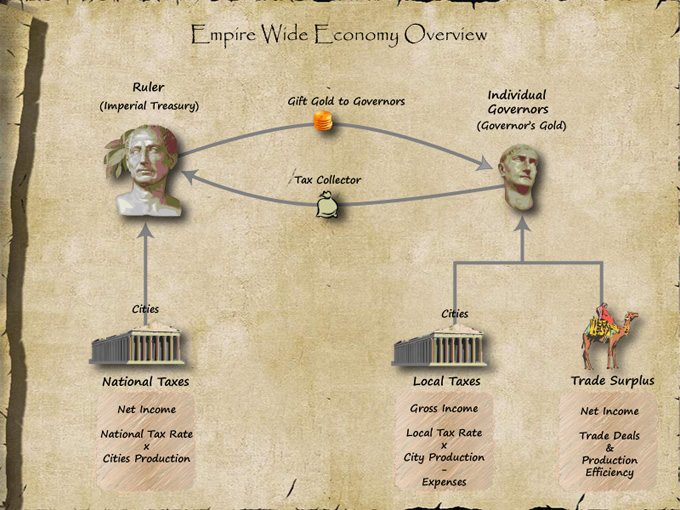
There is a lot of gold moving around the system but unfortunately not all of it heads in your direction. As Supreme Ruler you receive only the national tax take which is levied on the production of each city at your prescribed rate of taxation.
Importantly, this is net income. Order the royal tax collector to take a 15% slice of each cities production and that's what you get. Nothing more, nothing less.
This is good. Want more gold? Simply prod the royal tax collector into a frenzy of activity and lo and behold, the Imperial treasury will soon be overflowing.
Sadly it isn't that simple. Yes you can raise the national tax rate to usurious levels but all that would happen is that your empire would implode as various cities revolted.
The major downside to the national tax take is that it is a blunt, crude instrument of economic power. It affects everybody equally.
An appropriate taxation burden for one city may well be a call to arms in another.
Unless you are in dire straights it is best left at low levels so as to offend as few people as possible.
Onwards. To the cities.
They each have two sources of income, city taxes and their trade surpluses.
City taxes are, identical to national taxes, levied on the cities production. More production, more taxes. However unlike national taxes the city tax is a gross income. Before the gold reaches the Governor’s strongbox it is used to pay for expenses.
So a 15% national tax is going to take a lot more gold than a 15% city tax as the national tax take is net versus the local gross take.
But the city tax is a highly adjustable, fine tuned economic instrument. Fabius Delicatus versus Big Bad Bruce Brutus.
Take some time to tailor your city tax rates. Wealthy cities (especially if they are equipped with arenas) can handle higher levels of taxation than their smaller, less productive cousins. As you'll see shortly, higher levels of city tax actually increase your net gold gain beyond any expected standard percentage increase.
Trade. As a ruler you sign trade treaties with other nations. Each of your cities with a market then conducts trade with the aforementioned nations. The profits derived from the trade routes are a city income, not a national one.
Yes, oh mighty one. It is you who must sweat the diplomatic deals and yet the benefits flow to your uppity, ungrateful Governors.
Indeed. The trade surplus pours straight into the Governor’s strongbox and is impervious to any taxation, national or city.
Keep in mind that as Ruler you have effective control over your nation's capital city which is likely to be the largest city in your empire. Any city tax and trade surpluses find their way into the imperial treasury as it is one and the same as the Governor's stash in this case.
O.K, that's the three sources of income and where they flow to. Either to the imperial treasury or the individual Governor's strongboxes.
Gold can move between the two destinations. It can be gifted by your good self to any Governor in any city at any time. Your generosity, oh wise one, knows no bounds.
What about those filthy rich Governor's living a life of luxury in their wealthy cities? How can you siphon off the cream from their strongboxes?
There is only one way and that is through a tax collector, a type of guest. He is a very valuable guest, the tax collector. Pay him his 12 gold every turn without rancour and make sure he gets as much fine food and drink as he wants. Toss a few nubile nymphs his way from time to time. Ensure that the Royal Chariot is at his disposal.
He can, at your command, journey to any city in your empire and extract from it as much of the pile of gold coins in the Governor's strongbox as you desire. The tax collector is all powerful and even highly popular Governors with vast armies at their disposal are powerless to resist his greedy grasp.
Now lets take a closer look at how an individual cities economy works.
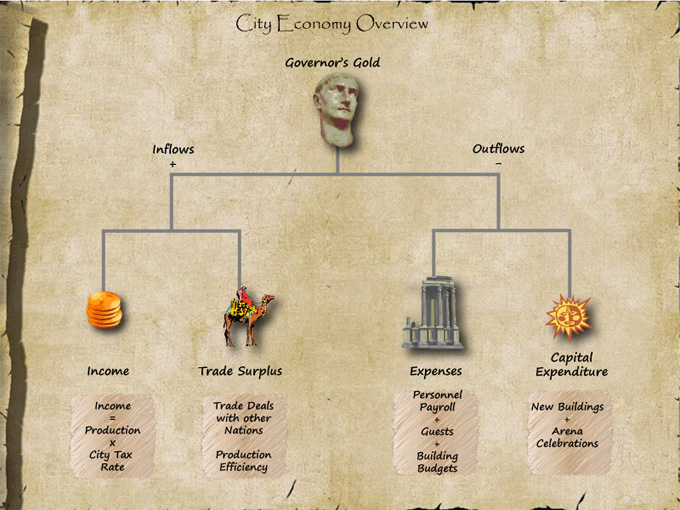
Gold. Up front or no deal.
What can he do to increase his gold reserves? Well for a start he can cut down on expenses. Does he really need to have eight generals sitting in his reserve, 'just in case?' They are all drawing a wage.
What about production? If he could somehow increase the production of his city then his tax take would improve.
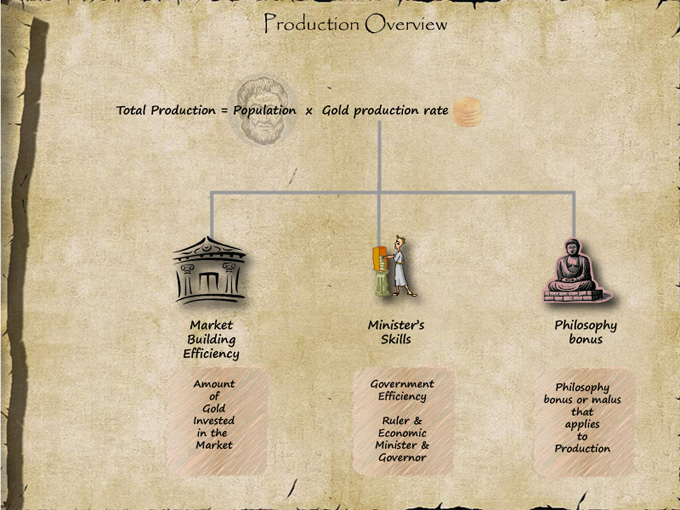
Not really but it's worth paying attention as this is where the gold is made or lost.
Straight up you can see that your cities production is its population multiplied by something called it's 'gold production rate'. So a larger population means a larger economy which in turn means more tax.
Great. Order everybody to have more kids. Hold orgiastic feasts. Offer every immigrant their own olive grove. Minimise the amount of plebs being shoehorned into the army.
What about the other side of the equation? The gold production rate (my term, it's a hidden number in the game that changes in response to the following...) is a factor of how much money you have invested in the cities market, the efficiency of the government and the effects of your philosophy.
Lots to consider here. Lets start with the Minister's skills. There is another Guide that covers this but in short you need people with high levels of Political skill in the positions of Governor, Economic Minister, Prime Minister and Ruler (in that order or importance).
Philosophy. There is only one that will assist you in your endeavours to make your city more productive and quite a few that will hinder you.
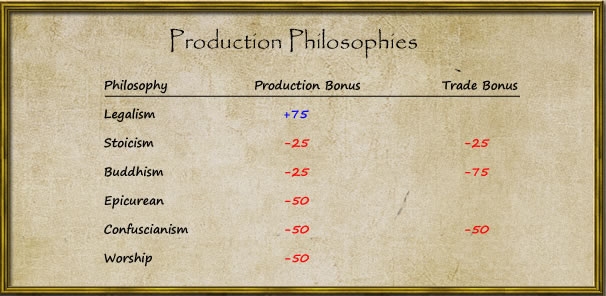
All those flaky eastern type religions and a couple of others found way out in the badlands are nothing but a drag on your economy.
While we are looking at philosophies, lets also consider trade. Same story. One that helps, lots that don’t.
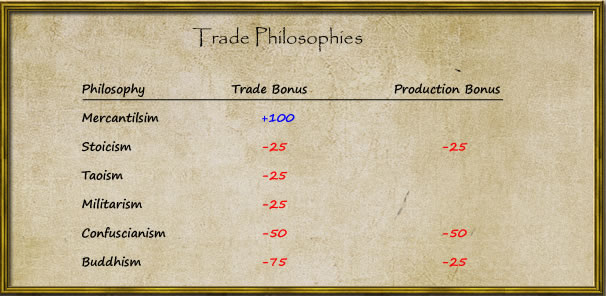
Looking at the list it's another case of flaky eastern type philosophies bombing out on the economic front. There’s a good reason that McDonalds is called as it is instead of McWong.
Ahh, but before we rush to judgement re: the superiority of the ancient capitalistic societies of the west it's worth remembering that every philosophy has a downside. With the economic powerhouses of Mercantilism and Legalism one aspect of this is that you end up surrounded by a lot of money-grubbing dishonourable generals and governors.
Conversely the eastern philosophies have many advantages in other areas, notably spirituality and culture.
Philosophies are difficult things to change and it tends to take quite a while. So for the purposes of a discussion about gold you are probably stuck with what you've got here.
Government efficiency is something that you have a measure of control over. However promoting the generals with the highest political ratings to Governors of all your big cities isn't cut and dried.
As mentioned in another Guide, an efficient administrator (eg. High political rating) may not necessarily be trustworthy. There isn't a lot of point making Giveus Lotsus the Governor of Tarentum only to find that several years later he rebels and takes the city with him.
Lets see how it works in practice.
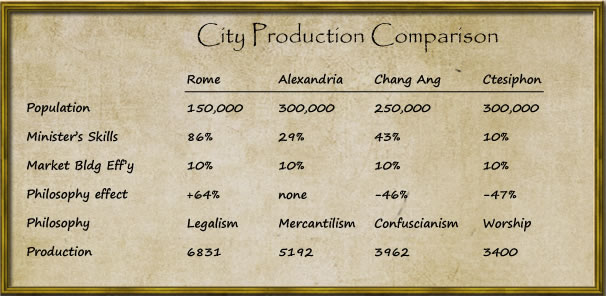
For the purposes of comparison I've deliberately left all markets at their default building efficiency levels of 10%, eg. No investment.
Rome has the highest production of all yet it has the smallest population by far! How can this be? Well it benefits from a team of red hot administrators (86%) and a production orientated philosophy, Legalism.
As a consequence Rome has double the production (and remember its production that drives your national and city tax take) of the Parthian city, Ctesiphon, despite having half it's population. Impressive.
Alexandria has a large population, substandard administrators and a philosophy that neither helps nor hinders its production. Despite this it still manages to out produce the Han and Parthian cities by a fair margin.
Why? Chang Ang has much better administrators than Alexandria but it is hobbled by its belief in Confucianism which is holding back it's economy.
Ctesiphon, apart from having an unpronounceable name, suffers from a bunch of complete dills (10%) running the show and another anti-wealth philosophy. Even its huge population can't overcome the twits in charge and their priest's hostility to wealth creation.
Now I'm going to invent a city called 'Goldilockus', home of every vice known to mankind. A wicked, evil cesspot where everybody is focused solely on eating as big a slice of the wealth pie as they can ram into their greedy mouths.
Goldilockus has a sizeable population, is run by a cliché of competent administrators (50%) and believes in nothing much of anything other than its own self interest.
It has a decent production of 2260 gold per turn.
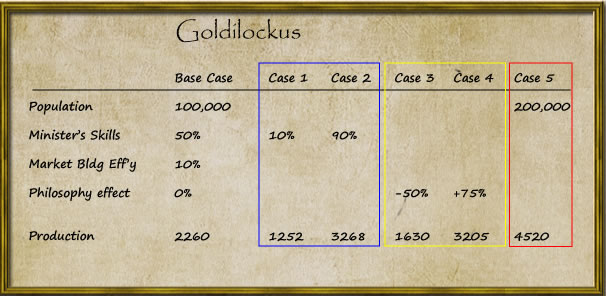
The merchants rally, spike poor old Wufus Dufus's wine and, to assuage their guilt, promise to bury him in style – when they get around to it. They then elect a probusiness General to the position of Governor, Abacus Smarticus (Case 2) and hire more staff as they rake in the moolah. Goldilockus's production skyrockets to 3268 gold per turn and all is well in the world once more.
Ah, but it's not. A firebrand priest by the name of Meus Goddus (Case 3) spreads heresy throughout the plaza's eventually turning the population against the merchant class and their way-too-clever puppet, Abacus Smarticus. The competent administrators are reinstated and the citizens of Goldilockus begin worshipping Chookus Dookus, the great and all-knowing God of poultry. Production slumps to 1630 gold per turn.
Chook worship rises to a crescendo, peaks, then passes with a limp squawk. Legalism (Case 4), promoted by the current administrators, flows into the religious vacuum and takes root. City production makes a dramatic recovery to 3205 gold per turn.
The fad of different philosophies and Governors eventually fades away and normality returns to Goldiluckus. Citizens return to normal duties and concentrate on fertilising the next generation. The population explodes (Case 5) and production hits an all time high of 4520 gold per turn as the presence of so many extra workers and consumers make themselves felt.
From the recent history of Goldiluckus we can garner certain facts. The difference in the cities production between having top shelf administrators in charge (Case 2) and Wufus Dufus and his mates (Case 1) is 2016 gold per turn.
The difference between Chook worship (Case 3) and the best possible production orientated philosophy (Legalism, Case 4) is 1575 gold per turn.
Finally the difference as a result of the population being doubled is 2260 gold per turn.
All three factors, Minister's skills, Philosophy and Population have a significant effect on your cities production and hence your taxation.
Investing in the Market
There is one further consideration (following on from Lesson 4) to take into account which hasn’t been mentioned yet and that is the amount of money you invest in the market. This is where you have the most immediate control over your economy.
All of the above examples have assumed a zero investment in the city market which gives it a building efficiency rating of 10%, the default.
Let's crank it up and see what happens.
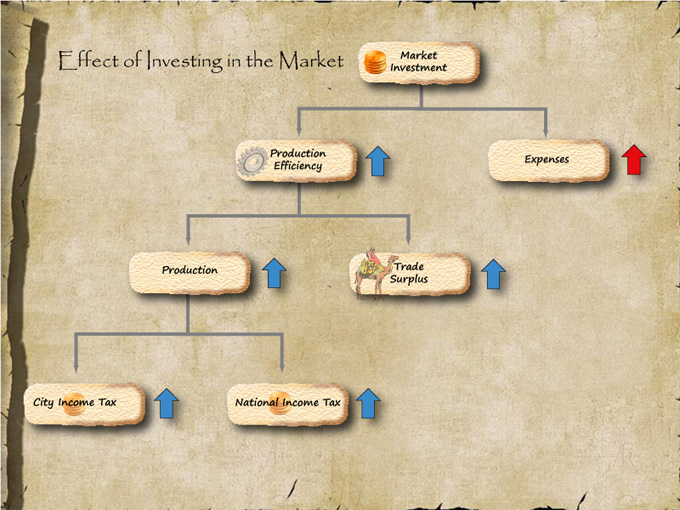
Two things flow from this increased efficiency. Both your Production (amount of gold produced by your city each turn) and your Trade Surplus increase accordingly.
Because your Production has gone up your City and National Tax take increase proportionally.
This is all to the good. On the other side of the ledger your City Expenses skyrocket by the same amount that you have invested in the market, which isn't so good.
At the end of the day the Governor of the City puts in his strongbox – as a result of his market investment – the City Tax take less the increased Expenses and plus the increased Trade Surplus.
You, the Supreme Ruler, pocket a larger National Tax take from the city.
There is a fair bit here to get your head around but if you think of it as the Governor making a series of short term loans to Merchants in the city then it gets a lot easier.
The Merchants, with the extra funds, are able to expand their businesses and generate more income. All this increased activity and income creates economies of scale and the overall efficiency of the city improves. With a larger, more efficient economy, more taxes can be drawn out and more tariffs charged on the higher level of trade.
Everybody is happy except for the Governor when he realises that all the money he lent isn't ever going to be repaid. Deadbeat debtors abound.
How about seeing it all in action. Here's Rome, centre of all things Roman.
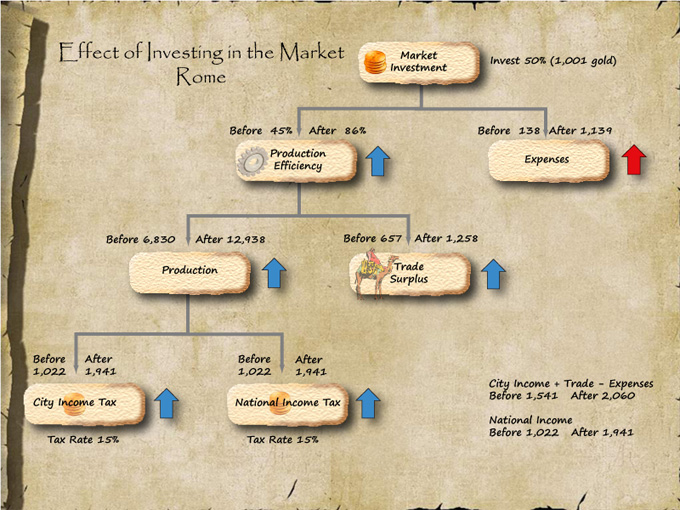
Another 900 or so gold tinkled into the Imperial Treasury without any effort on your part.
So have we found the way to instant fame and fortune? Has the secret to unlimited wealth landed at our feet?
It depends.
Let's reinstate Goldiluckus and make it the nation's capital.
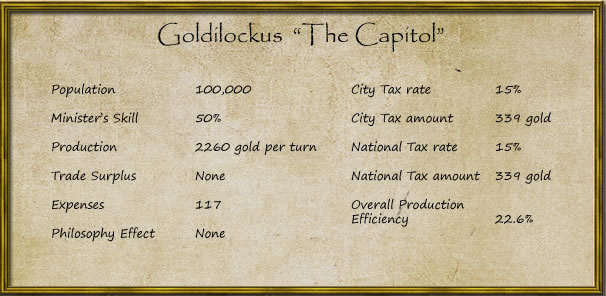
Right. The Governor decides to shake things up and invest in the market. All those penny pinching merchants are lining up outside his palace to receive their handout with a solemn promise of generating more business.
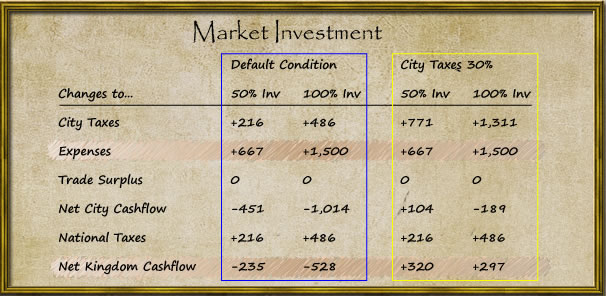
Basically the expenses involved in funding the market are overwhelming the increased tax revenue that is generated from the greater production. Investing in the market in this instance is a sure way to go belly up fast.
What happens if the Governor decides to up City Taxes from 15% to 30%? Well it improves the situation to the point where there is a small amount of money coming in overall but the City treasury is still suffering. Note that the expenses involved in funding the market are constant as they are a function of the cities population.
The downside of jacking up the taxes are many and numerous. Yes, you are making a net gain from his market investment but this is more than offset by the negative repercussions that flow from higher taxes – increased unhappiness, lower population growth and falling popularity.
So it would be fair to say that investing in the market in both the default and 30% tax scenarios is a dead end strategy. As in don't do it.
Perhaps the problem is a lack of population in Goldilockus?
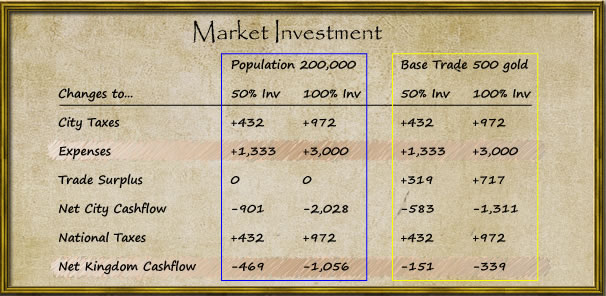
This is because the expenses, as mentioned, rise in proportion to population. So to fund a 100% market investment it now costs the long suffering Governor 3,000 gold as opposed to 1,500 gold when the population was half what it is currently.
The increase in taxes (both tax rates are back at the default 15%) isn't nearly enough to offset the rise in expenses.
As mighty Ruler you may have noticed that there is no trade income. Spraying emissaries out across the known world in a shotgun eruption of enthusiasm you manage to sign a trade deal or two.
Goldilockus is now a player in the great game of world trade. It has a base trade income of 500 gold which is appropriate for a city of 200,000 with no particular aptitude for international transactions (any city that once worshipped Chookus Dookus can't be expected to have wide horizons).
Now the city still loses money but only minor amounts as the increased trade income takes up the slack. Imagine what would happen here if Goldiluckus really hit its straps and became a trade powerhouse.

Oh boy. Economic Armageddon. Wufus Dufus is too busy holding mutual dribbling sessions with his closest advisors to notice but Goldiluckus is well and truly on the rocks.
To avert economic ruin Wufus is speared with a stake through the heart and sprinkled with rosemary. Everybody hopes that this is last that they will see of the ghostly grinning galah and Smarticus Abacus assumes the Governorship.
What a difference! Boom times for all. The streets of Goldiluckus are paved with the shiny stuff. Every plebeian rises to the rank of patrician. Slaves are pardoned. Cats marry dogs. Wealth abounds.
1. High levels of Minister's skills (Governor being the most critical)
2. Decent Population base (I wouldn't bother with anything under 100,000)
3. Reasonable levels of Trade income (needed to offset the higher expenses)
4. City tax rate (higher the better but this is a last resort)
Naturally every city has its own set of unique circumstances but you should be able to make an informed judgement given the above.
Any city with Legalism (production bonus +75) is a special case and a stand-out candidate for market investments.
It's interesting that in any nation the city most likely to be suitable for pump priming their market is going to be the capital. Here is where you have the most potential for creating extra wealth.
Any funds in your capital are part of your Imperial treasury and maintaining sufficient gold to kick start the market is not easy as the demands on your treasury are substantial, particularly as your empire grows.
Ideally you'd aim for an ongoing fully funded market and restrain yourself by spending only the profits. Good luck.
To give an indication of how much of a gold buffer you need here is the cost of funding a market at different population levels.
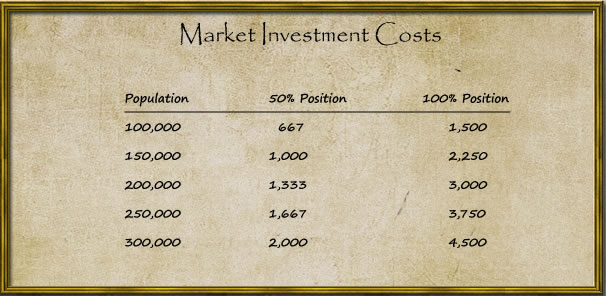
Cheers,
Lancer
